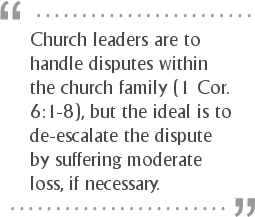What Does ‘Love Your Enemies’ Not Mean?
Body
“How do we square Jesus’s command to ‘love our enemies’ with David saying ‘I hate … my enemies’? Four realities from Psalm 139 help us see that Jesus and David aren’t in conflict” - TGC
Discussion
Give to Those Who Ask
Reposted from Rooted Thinking.
In Matthew 5:42, Jesus said, “Give to the one who asks of/begs from you.” This command of Jesus is not an easy one to apply. Christ’s words are straightforward: we must respond to those who, in their poverty, ask help from us.
Discussion
The Tale of the Two Builders
Recently, our family drove from Washington State to Tennessee, to drop our oldest son off at college. One day, in the wilderness of western Colorado, I spied a shiny new Corvette ahead of me. It was plodding along at about 65 mph on a stretch of interstate where the speed limit was 80 mph. Yet, there he stayed—at 65 mph.
Discussion
How Jesus Used the Old Testament in Matthew 5:21-48 (Part 2)
Read Part 1.
Fulfillment of the Law and the Prophets includes the prediction that the New Covenant would replace the older Mosaic Covenant.
Discussion
How Jesus Used the Old Testament in Matthew 5:21-48 (Part 1)
With Matthew 5:21-48 Jesus quoted the OT seven times. Six of these involve an OT command from the Law of Moses followed by the statement “But I say to you …” A seventh concerns a statement that Jerusalem is “the city of the great King,” a reference to Psalm 48:2 in Matthew 5:35. This latter example, from Psalm 48:2, is a contextual affirmation of the significance of Jerusalem. Our attention, though, focuses on the other six uses of the OT. These reveal how Jesus viewed himself in relation to the Law of Moses. These six uses of the OT by Jesus are:
Discussion
Mechanical Religion - Isaiah 58 and Matthew 6
In my first book, The Midrash Key, I argue that many of Jesus’ (Yeshua’s) teachings—including sections of The Sermon on the Mount—find their origin in Deuteronomy or Leviticus. Our Lord gathered a large crowd together for the Sermon on the Mount, so we know it was much longer than the eleven-minute summary found in the Gospel According to Matthew. Two hours would be the bare minimum, but He probably taught all day. We only have the summary the Gospel writers preserved.
Today I am suggesting that another part of The Sermon on the Mount (Matt. 6:1-4, 16-23) finds its origin in Isaiah 58:1-8. I believe Jesus commented on and developed themes from this text. See if you agree with me.
The theme of this section is “God detests mechanical religion.” In other words, God does not want our lip service, He wants our hearts, our selves. He has no tolerance for mechanical religion; He will not be controlled or manipulated. We can obey Him, but we can do Him no favors. We owe Him total allegiance by birth.
How we live on a daily basis is also a spiritual issue. When it comes to being a follower of Yeshua, we are not allowed to segment ourselves. We may be more “secular” in our jobs or among our lost family members than we would be with fellow believers, but we still must adhere to Christian ethics and conduct.
Discussion
On Being Generous with Grace







Discussion